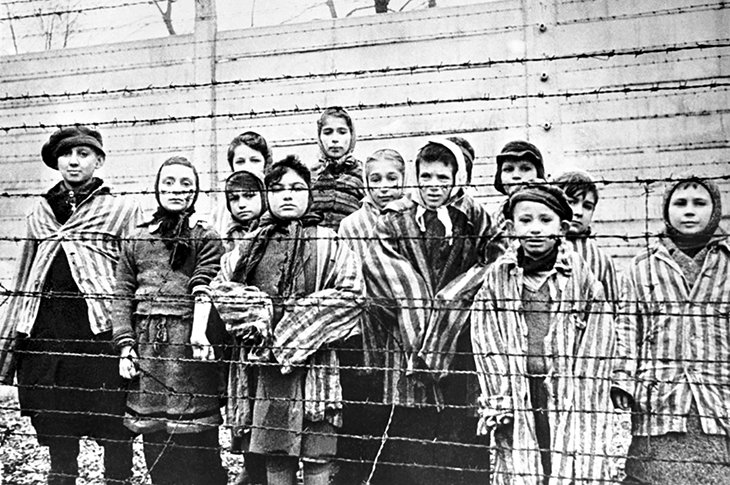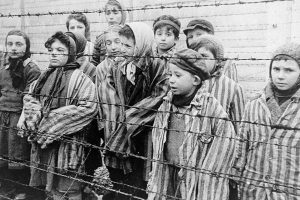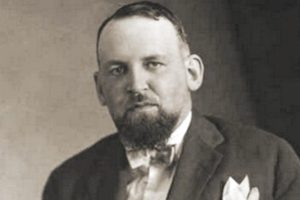A week of remembrance marking the 75th anniversary of the liberation of Auschwitz last month had me thinking hard about what we mean by Evil. ‘Evil’, that is, when used with a real or metaphorical capital letter. You cannot join discussion of the Holocaust without hearing the word again and again. And indeed, what other words are available when we want to express complete horror? ‘Regrettable’? ‘Immoral’? Such vocabulary won’t do the job. Only ‘wicked’ and ‘sinful’ come anywhere near, and all are allied with what Evil, as a proper noun, tries to capture.
‘Evil’ eschews any notion of understanding or explaining, and sits uneasily with the idea of rectification, compensation or apology. It’s hard to reconcile even with thoughts of forgiveness. And ‘Evil’ brushes aside the possibility of miscalculation, error, ignorance or accident. ‘Evil’ is so much more than mistaken judgment, lapsed attention.
Perversely, there’s something positive about the word. Study its use (for instance in popular newspaper headlines or politicians’ responses to terrorist incidents) and you get the sense of some kind of cosmic force, a living thing, a malign spirit. The word describes significantly more than the evil deed itself, but something inhabiting that deed — as the wind fills the billowing sail, but is not the sail. The Zoroastrian or Manichaean religion — the faith of the Persians — gives it a central position in the universe, and sees the world as in perpetual contention between a dark power and a light one; and I sense from the language of Islam that Muslim thinking too is comfortable (if that’s the word) with the full-blown concept.
But Christianity, which in most of its forms must be said to have a place for Evil in its conception of the universe, has often sounded slightly awkward about the idea. Dualism of the Persian kind is technically a heresy for Christians, conferring on the dark side a status they’re not supposed to acknowledge; but among ordinary worshippers I have to say that the Manichaean heresy thrives. During my five-year stint on the (then) Broadcasting Standards Council I was struck, whenever programs touching on Satanism were broadcast, by how many letters of complaint came from strong Christians. Our complainants sounded genuinely scared of dark powers, and I remember reminding our chairman, who had become indignant over a TV fictional depiction of a Satanist cult, that the Devil — surely? — didn’t exist, and there was no cause for viewers to feel afraid.
‘Deliver us from Evil.’ Reciting the Lord’s Prayer from an early age, I grew up with the idea, powerfully if imprecisely grasped. Later on, I followed debates in which Christian moralists lamented the erosion of the concept. They saw it as indicative of a weakening sense of right and wrong. Many still do, and it’s common among preachers and some of our prominent lay moralists to complain that in urging us to ‘understand’ what may have driven wrongdoers to their wrongdoings, sociology, apostles of the ‘permissive’ society and ‘progressive’ thinkers generally are blurring moral standards. The idea that to know all is to explain all (they think) blinds us to the presence of Evil, and I used to believe that. But I was always troubled by what in a non-dualist universe the word ‘Evil’ could be referring to, except as a way of registering extreme dislike of the actions for which we blame these supernatural forces.
Supernatural forces. It has taken me almost 70 years to realize that the concept of Evil is not a stern corrective of errant behavior: it’s an evasion, a way of hiding our eyes from what men are or can be, or can do.
During Holocaust remembrances, perplexed by repeated references to this dark force, I asked myself the age-old question: why? Why, how, could apparently ordinary German citizens have connived in this obscene butchery, assisted in it, or (in most cases) just turned away. Ah! Evil. But no, that won’t do. So I rang Rob Rinder, who’s deeply immersed in this terrible chapter in European history, and asked what I should read. ‘Ordinary Men,’ he replied at once: by Christopher R. Browning; subtitle Reserve Police Battalion 101 and the Final Solution in Poland. ‘Buy the paperback,’ he said, so I did, and read it in a single ghastly sitting.
Browning had tracked down the judicial records of a rare and unusually thorough post-war West German investigation of the survivors of one battalion of paramilitary policemen drawn from predominantly but not exclusively working-class backgrounds in and around Hamburg, most from civilian life. The personal testimonies are remarkably candid. The mission imposed upon these men was to kill Polish Jews, largely indiscriminately: not in extermination camps but town by town, village by village, in what amounted to systematized pogroms. Usually they’d herd their victims to field or forest nearby, shoot them, and leave the bodies. But often enough they’d execute Jews where they found them — at home, or in town streets or squares. Over the years this battalion killed tens of thousands.
I cannot possibly summarize Browning’s findings. Read the book! It’s shocking — in a sense even worse than concentration camp stories because the contact was so personal, man-to-man, man-to-woman, man-to-child, shooting in the neck, shooting brains out, again and again and again, all day, every day.
Browning does not find that racist ideology or pure anti-Semitism was generally the prime motivator (though it was universally present), but concludes that — by associating the Jews with ‘the enemy’ during a war — peer-group pressure from comrades, and sheer grisly routine, numbed these men. It had a terrible effect on many. They drank away the horrors; few admitted to deep moral objections but all but a few sadists hated the work. The battalion’s chief permitted them to drop out without reprisals. Some did — up to 10 percent — but most didn’t.
The word ‘Evil’ does not appear much in Browning’s survey and nor really does it figure in his conclusions. As I read on, and my discomfort grew, I realized that the insertion of ‘Evil’ into his analysis would not sharpen my distress as an onlooker. It would relieve it. It would be an explanation, a diabolus ex machina. Without it, the reader is left to face something much more frightening: that ordinary human beings are capable of these things without extraordinary explanations. Ordinary human beings like ourselves. To me, that is so much scarier than Satan.
This article was originally published in The Spectator’s UK magazine. Subscribe to the US edition here.



















